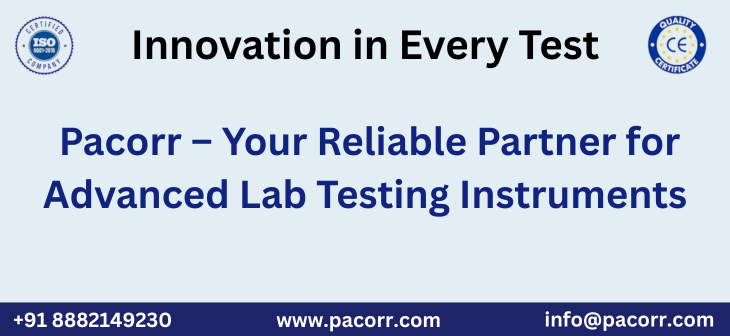
Pacorr is renowned in the field of material testing instruments, consistently offering precision and reliability in their equipment. One of Pacorr’s standout offerings is the Tensile Testing Machine, meticulously engineered to comply with global standards such as ASTM D638 and ISO 527. These standards provide critical benchmarks for assessing the tensile strength, elasticity, and deformation characteristics of plastics and polymer materials, ensuring manufacturers deliver consistently high-quality products.
Understanding Tensile Strength Testing
Tensile strength testing is essential to determine how materials behave under tension, reflecting their capability to withstand stress before fracturing. This is particularly important for industries such as automotive, aerospace, construction, packaging, and consumer products, where material integrity directly affects performance and safety.
Overview of ASTM D638 Standard
The ASTM D638 standard is specifically designed for plastics. It outlines methods for evaluating tensile properties of plastics, including tensile strength, elongation, modulus of elasticity, and Poisson’s ratio. Adherence to this standard ensures uniformity in testing methods, allowing results to be accurately compared and validated globally.
ASTM D638 Specimen Types
ASTM D638 specifies five different specimen types:
- Type I: The most commonly used for rigid and semi-rigid plastics.
- Type II: Used for plastics that are difficult to mold into Type I.
- Type III: Smaller specimens suitable for limited material availability.
- Type IV: Used for testing very thin films.
- Type V: Ideal for highly flexible plastics.
Each specimen type has precise dimensions and preparation guidelines, which must be strictly followed to ensure accuracy and repeatability.
ISO 527 Standard Explained
ISO 527 is an international standard closely aligned with ASTM D638, providing procedures for tensile testing of plastics. This standard has multiple parts covering different material forms:
- ISO 527-1: General principles.
- ISO 527-2: Test conditions for molding and extrusion plastics.
- ISO 527-3: Conditions for testing films and sheets.
- ISO 527-4: Conditions for isotropic and anisotropic fiber-reinforced plastic composites.
- ISO 527-5: Conditions specifically for unidirectional fiber-reinforced composites.
ISO 527 emphasizes consistency in testing speed, specimen size, and data collection methods, enhancing the comparability of results across international laboratories.
Differences and Similarities Between ASTM D638 and ISO 527
While ASTM D638 and ISO 527 standards share many similarities, such as fundamental testing principles and goals, some differences should be noted:
- Testing Speed: ASTM D638 typically recommends test speeds of 5 mm/min to 50 mm/min, while ISO 527 provides broader guidance depending on material type and specimen dimensions.
- Specimen Dimensions: Slight variations exist in specimen sizing and shape requirements, with ISO 527 often providing more extensive guidance for various materials and product forms.
- Data Reporting: ASTM D638 emphasizes detailed reporting of stress-strain curves, tensile strength at yield and break, elongation, and modulus of elasticity, whereas ISO 527 includes similar but more flexible data reporting requirements.
Pacorr Tensile Testing Machine: Compliance and Precision
Pacorr's Tensile Testing Machine is designed explicitly to adhere to ASTM D638 and ISO 527 standards, ensuring global acceptance and reliability. Key features include:
- Advanced Load Cells: Highly sensitive and calibrated load cells provide accurate measurements of force applied during tests.
- Digital and Automated Controls: Automation capabilities reduce human error, ensuring tests meet exact specifications.
- Precise Strain Measurement: Integrated extensometers provide accurate elongation data, essential for compliance with ASTM and ISO standards.
- Robust Software Interface: Pacorr’s software simplifies data collection, analysis, and reporting, aligning with the detailed reporting requirements of both standards.
Importance of Adhering to ASTM D638 and ISO 527
Compliance with these standards ensures:
- Quality Assurance: Consistent testing leads to reliable product quality, enhancing consumer trust and reducing product failures.
- International Market Access: Meeting these globally recognized standards allows products to enter and compete in international markets seamlessly.
- Enhanced Safety: Accurate tensile testing identifies potential product weaknesses, enabling manufacturers to proactively mitigate risks and enhance safety.
Applications Across Industries
The Pacorr Tensile Testing Machine, compliant with ASTM D638 and ISO 527, is utilized extensively across various industries:
- Automotive: Assessing durability and performance of plastic components such as dashboards, bumpers, and internal fittings.
- Aerospace: Ensuring composite materials withstand demanding environmental and mechanical stresses.
- Consumer Goods: Testing plastic packaging, toys, and household items to guarantee long-term reliability and safety.
- Construction: Evaluating polymer-based construction materials like piping and insulation for structural integrity.
- Healthcare: Validating the strength and flexibility of medical-grade plastics and equipment.
Conducting Accurate Tensile Tests
For accurate results, following the guidelines for specimen preparation, calibration, and testing environment specified by ASTM D638 and ISO 527 is critical:
- Specimen Preparation: Correct specimen molding, cutting, and conditioning.
- Calibration: Regularly calibrated equipment ensures accuracy and repeatability.
- Testing Environment: Controlled temperature and humidity to minimize external influence on test outcomes.
Conclusion
Pacorr’s Tensile Testing Machine, designed in alignment with ASTM D638 and ISO 527 standards, offers unparalleled accuracy, reliability, and global compliance. This instrument is an indispensable tool for ensuring material strength, enhancing product safety, and supporting quality assurance across numerous industries. Choosing Pacorr means investing in precision, consistency, and confidence in every tensile strength evaluation.
Thanks to Pacorr Testing instruments, we have all the required quality testing instruments that have helped us to ensure the best quality delivered to our clients.

Danish
Fair Exports Pvt. Ltd.

